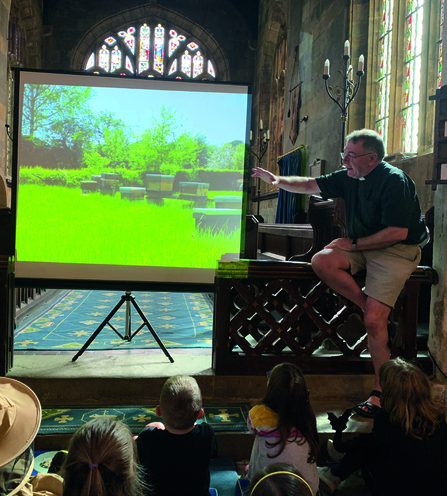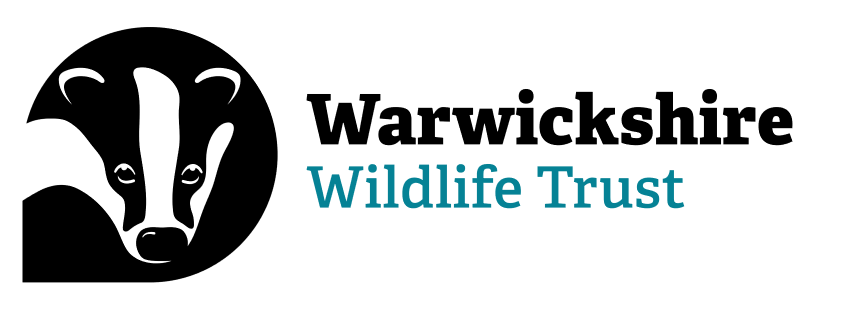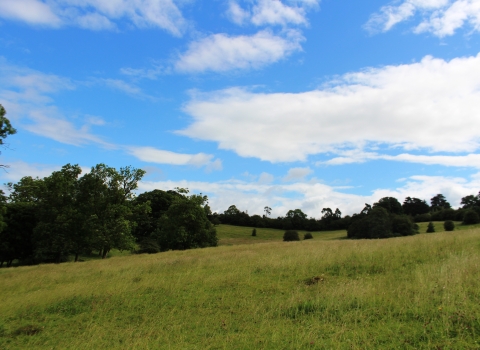#TeamWilder is The Wildlife Trusts’ new initiative to empower communities and individuals to take meaningful actions that bring about nature’s recovery on land and at sea. We want to see at least 30% of our land and seas in recovery by 2030, but we can’t do this alone.
A community network group in South Warwickshire has been living the #TeamWilder ethos long before it was publicised, so we invited Shirley Cherry, from the South Warwickshire area Network (SWAN) for Wildlife, to tell us how they are inspiring their local communities to act for nature. Hopefully, their story can inspire other communities to be on nature’s side too.
Our Aims
The South Warwickshire Area Network (SWAN) for Wildlife provides a forum or hub for local wildlife groups to get together to share ideas and initiatives. The aim of SWAN for Wildlife is to learn from each other by exchanging ideas and experiences. We visit one another, collaborate on wildlife projects and provide extra resource when needed. All our members seek to engage with their communities, helping people of all ages connect with nature and make spaces where wildlife can thrive. By joining up the efforts of individual wildlife groups, the network is supporting nature’s recovery on a large scale across South Warwickshire.
About our Members
The network already includes representatives from 13 villages and the list keeps growing! Some of the groups, like the Oxhill wildlife group (OWLS) and a group in Stretton-on-Fosse, have been established for about 15 years. Others, like the groups in Cherington, Stourton and Epwell are still in the early stages of establishing themselves within their communities. All of them share a love of wildlife and want to encourage it.
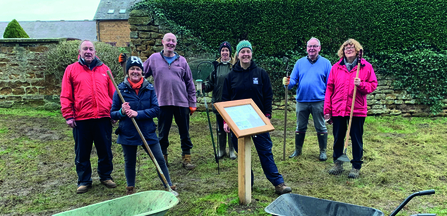
Wildflowers
A common thread throughout the network is the planting of wildflowers. These areas may not always look pretty in the conventional sense, but the benefits to nature are significant.
The churchyard at St Edmunds, in Shipston is currently being developed into a wildflower area and will have its own hive of bees, provided by Shipston Beekeepers.
The churchyard at St Lawrence’s in Oxhill has been maintained and developed over the past 12 years with spectacular results, delighting visitors and wildlife with a wide variety of wildflowers. “It’s been joyful to watch all the insect life returning”, said Jane Smith, who has been managing the project at Oxhill. Last year she counted 17 species of butterfly in an area that was previously just short grass.
Tysoe’s ‘Making Space for Nature’ initiative started in 2019 with the dedicated wildflower area in St Mary’s Churchyard. This was extended to include the verge in School Lane and strips around the edge of the football pitches and recreation ground. Tysoe Wildlife has been fortunate to take part in the ‘Wilder Communities’ project, managed by the Warwickshire Wildlife Trust and funded by Severn Trent. As part of the project, Olivia Williams, one of the Trust’s Community Engagement Officers, helped the Tysoe team to sow wildflowers. Since coming to Tysoe, she has been helping other members of the network, such as Stretton-on-Fosse, to sow wildflowers beside their football pitch and their community orchard.
“This network is doing such great things for wildlife and it has been a privilege to be involved thus far. It has been amazing to work with so many nature enthusiasts and witness the passion they have to help bring nature back. Hopefully this ripple effect will continue to radiate outwards, inspiring more positive action for nature.”
Community Engagement
Some new members have asked how to go about engaging with their community. Fortunately, help was at hand, as Preston Environmental Group (PEG) was able to share a questionnaire and its findings, used as the basis for setting up their own Village for Nature. As part of their project, 56 questionnaires were delivered, one to every household in the village. Respondents were asked about their gardens, which wildlife they had seen and if they would like to be involved in a nature project in the future. The responses were really encouraging, with 43 of 56 households filling in the questionnaire.
- 75% already have bird feeders
- 65% have seen frogs in their gardens
- 25% have seen a hedgehog
- 60% want to get involved with Village for Nature
These results confirmed what PEG suspected, that the villagers really appreciate living in a rural location and love sharing it with wildlife.
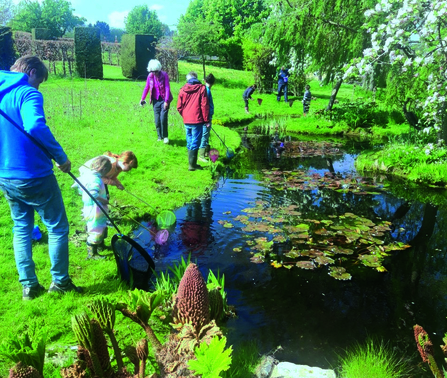
Walks, Talks and Pond Dipping
Walks and talks are another way of engaging with communities. Between them, the wildlife groups have arranged butterfly walks, dragonfly walks, moth trapping, and bat detecting with the Warwickshire Bat Group. Bat detecting is a winner with families who enjoy using the bat detectors and identifying the different species of bat. Stretton’s annual pond dipping is a very popular event. This year it took place on a lovely spring morning and was led by Anna Pike, a local biologist. It was attended by both children and adults. Past experience showed field ponds to be depleted of wildlife, so for the last few years the group has dipped in a pond in a large garden managed for wildlife. The pond has proved to be a much better habitat for wildlife as the results below show. According to the Freshwater Habitats Survey Big Pond-dip, the pond is a ‘brilliant’ habitat as indicated by its top score of 44.
SWAN for Birds
Supporting birds is another shared interest across the network, with members running workshops to make nest boxes and supporting the RSPB’s Big Garden Bird Watch. There is action to protect swifts with article writing, the installation of swift boxes, and lobbying for the use of ‘universal’ nest bricks in new housing developments. There’s also a swift walk planned for July in Shipston. The ‘Wild About Clifford’ group has put swift boxes up in the church belfry at Clifford Chambers and hopes to encourage the birds in by playing recordings of swift sounds.
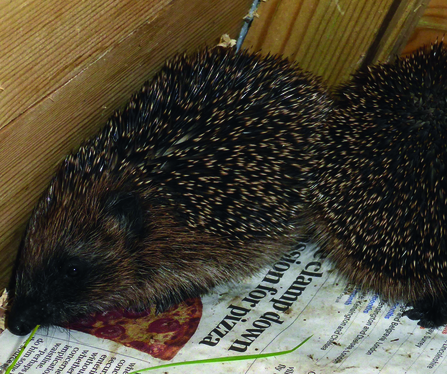
Fostering Hedgehogs
Looking after hedgehogs is a priority for members. In 2016, the ‘Wild About Clifford’ group decided to foster sick or underweight hedgehogs who would otherwise not have survived the winter. When the time came for the foster care hedgehogs to be released, the group contacted a new family in the village, who had four children aged 4 to 10, to ask if they would like one released in their garden. They said ‘yes’ and were provided with a hedgehog feeding station, food and a hedgehog house, along with a night-time camera to record any activity. They named their hedgehog Tornado (hedgehogs are surprisingly quick!). Thanks to this community work, Clifford Chambers now has a breeding population of hedgehogs.
A Wildlife Workshop
Another way to inspire the young with a love of nature is through running a wildlife workshop. Last summer, the Tysoe Wildlife group ran a Wildlife Activity Week at St Mary’s church, which was attended by thirty primary school children. The theme each morning combined science, crafts and games with the children learning about flowers and the lifecycle of plants, bees, moths, butterflies and hedgehogs. They also headed to Badgers’ Wood for a nature treasure hunt and quiz.
Looking Forward
As the network becomes more established, we hope to work together to support national campaigns such as #30DaysWild, the Big Garden Bird Watch, No Mow May and more. We hope to join forces with others to encourage the wilding of verges to support insects and small mammals and continue to find ways to make communities more wildlife friendly. SWAN for Wildlife is a great example of how the Wildlife Trusts’ #TeamWilder ethos can be put into action, encouraging groups of people to make a positive change for nature. Community organising is key to helping everyone to understand the need for change, now, and to recognise their own role in making that change happen. Thanks to Shirley and all the SWAN members for sharing their stories. If you have any #TeamWilder stories initiatives or questions you’d like to share and ask, then please email TeamWilder@wkwt.org.uk.
